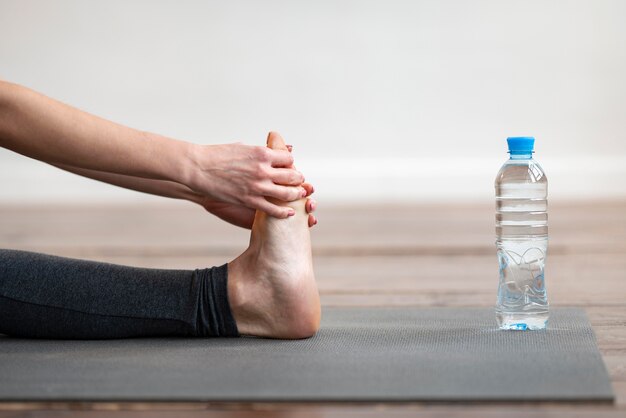
Ever wondered why you need to stay hydrated when you’re working out or going for a run? It’s all about fueling your body to perform at its best. Whether it’s lifting weights, doing yoga, or jogging, keeping hydrated is key to helping you feel and perform your best.
In this article, we’ll explore why staying hydrated is important and how to adjust your hydration to fit your workout. Let’s grab our water bottles and dive into staying hydrated while breaking a sweat!
Before we get into specific strategies for different exercises, it’s important to understand the basics of hydration. Since the human body is mainly made up of water, staying hydrated is crucial for things like regulating body temperature, transporting nutrients, and lubricating joints. When you exercise, you lose water through sweat, which can lead to dehydration if not replenished. How much water you need depends on factors like exercise intensity, duration, weather conditions, and how much you sweat.
Cardiovascular exercises like running, cycling, and swimming involve sustained, rhythmic movements that raise your heart rate and breathing, typically causing significant fluid loss through sweat. To stay hydrated during these activities, start off well-hydrated and keep drinking fluids throughout your session. Water is usually enough for moderate workouts under an hour, but for longer or more intense sessions, drinks with electrolytes can help replace lost minerals and improve hydration.
Strength training focuses on resistance exercises to build muscle strength, endurance, and mass. Though you might not sweat as much as you do with cardio, staying hydrated is still essential for muscle function and performance. Drinking water before strength training helps maintain fluid balance and muscle contraction. Sipping water between sets can prevent dehydration and keep your energy levels up. After your workout, replenishing fluids and electrolytes helps with recovery and muscle repair.
High-Intensity Interval Training (HIIT) involves short bursts of intense exercise followed by brief rest periods. HIIT challenges both your anaerobic and aerobic systems, causing rapid fluid loss through sweat and increasing metabolic demands. To stay hydrated during HIIT, drink water or sports drinks with electrolytes before starting. During the workout, sip water during rest intervals to maintain hydration without discomfort. After HIIT, replenish fluids and electrolytes to aid in recovery.
Endurance events like marathons, triathlons, and long-distance cycling require extended physical exertion, leading to significant fluid and electrolyte loss and risking dehydration and low sodium levels. Proper hydration involves a mix of pre-event hydration, drinking fluids during the activity, and strategic electrolyte replacement. Hydration plans should be customized based on sweat rate, weather conditions, and personal tolerance.
Team sports such as soccer, basketball, and rugby involve dynamic movements and varying environmental conditions, causing high sweat rates. Pre-game hydration is crucial, with players drinking fluids and electrolytes before the match. During the game, having access to fluids on the sidelines helps replenish lost fluids. Post-game, hydrating with water or sports drinks replaces fluids and electrolytes lost during play.
Yoga and Pilates, though low-impact, still require proper hydration for overall well-being and performance. While fluid loss is minimal in these activities, staying hydrated optimizes muscle function and mental clarity. Drinking water before a session primes the body for movement and boosts circulation. Sipping water between poses or exercises keeps hydration levels up without interrupting the flow. Post-session, drink water or herbal teas to rehydrate and relax.
Outdoor activities such as hiking, trail running, and rock climbing present unique hydration challenges due to varying terrain and conditions. Prioritizing hydration during these pursuits enhances performance, endurance, and enjoyment while minimizing dehydration risks.
In conclusion, understanding the importance of hydration tailored to different exercises is crucial for optimal performance. Whether you’re at the gym, on a run, or practicing yoga, staying properly hydrated enhances your endurance and well-being. Adjust your fluid intake based on the intensity and duration of your activity to maintain peak performance and enjoy your workouts more. So remember, hydrate smartly and feel the difference in your performance.
Hydration during exercise is essential to keep performance levels up and prevent dehydration. Aim to drink water regularly throughout your workout, about 7-10 ounces every 10-20 minutes. Three key hydration guidelines are drinking water before, during, and after exercise sessions. Pre-hydration starts you off with enough fluids, sipping water during exercise prevents dehydration, and post-workout hydration replenishes lost fluids and electrolytes. Hydration is crucial for exercise recovery as it restores fluid balance, helps transport nutrients to muscles, and supports the body’s natural healing processes. Proper hydration reduces muscle cramps and fatigue, promoting faster recovery and better performance in future workouts.